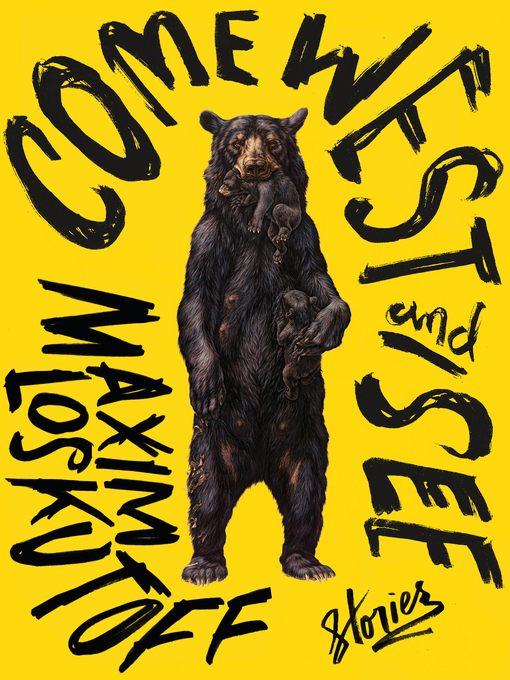
Come West and See
Stories
کتاب های مرتبط
- اطلاعات
- نقد و بررسی
- دیدگاه کاربران
نقد و بررسی

March 1, 2018
In this fresh first collection from Nelson Algren winner Loskutoff, refugees from civilization gather in the Northwest and sometimes violently resist intrusion. First, though, an opening story unfolding in 1890s Montana territory sets the mood; a trapper falls in love with a bear, reluctantly heads into town for female company when she hibernates, and succumbs to vicious jealousy when he returns to find she has a cub. In the present day, a desperate woman forces her boyfriend to drive her across state lines to find a vet who will treat her injured coyote, abandoning man for animal when they arrive. A fellow from Montana takes his wife to her family's cabin in Michigan, where a frightening encounter makes him realize that "the safety I dreamt of bringing Kimia, and our daughter, was only that: a dream." In the final story, another couple arrives from "traitor country" shot full of arrows even as federal soldiers gather across the mountains. VERDICT The stories don't always connect as much as one is led to expect, but the writing is sure-footed and the disquieting sense of a world upended successfully delivered.
Copyright 2018 Library Journal, LLC Used with permission.

March 1, 2018
Pensive, sometimes-explosive stories of life in the rural Northwest in a debut collection.A specter hangs over Loskutoff's stories, that of a rural outback in which the federal government is decidedly an enemy and live fire is exchanged. How you feel about some of his characters ("She was a neighbor, a mother. An American. A widow") may well depend on your take on such things as the Malheur National Wildlife Reserve and Ruby Ridge; certainly some of Loskutoff's characters are committed to the idea that they are unwelcome strangers in their own land, if with peculiar ideas about what their own land constitutes. "A friend of mine got shot dead yesterday," says one character matter-of-factly, adding, "Took seven feds with them." Perhaps less controversial is Loskutoff's vision of a place in which nature is very close at hand and the violence attendant is even closer: His characters, particularly men, are often likened to beasts ("Carston made a grunting noise like a wounded animal....He was big enough that he could stomp them both, done real damage, but it wasn't in him"), and in the troubling opening story, the protagonist, having evidenced some sympathy for a grizzly bear with whom he's sharing territory, kills a cub and wears its skin as a kind of savage declaration of who's in charge. Loskutoff acknowledges the guidance of his former writing teacher David Foster Wallace, but there is not much of Wallace's complex layering (or a single footnote, for that matter) in these tales; instead, the governing tutelary spirit is more on the order of Raymond Carver with a little Bill Kittredge and, particularly in that first story, the early Barry Lopez thrown in for leavening. In any event, Loskutoff writes a good sentence, has a fine eye for the meaningful detail, and spins stories that, while certainly not for every taste, are fully realized.A welcome arrival with the promise of good work to come.
COPYRIGHT(2018) Kirkus Reviews, ALL RIGHTS RESERVED.

March 26, 2018
Loskutoff sets his slightly disturbing debut collection in an alternate present during a new American Civil War led by libertarian Western separatists. As the rebellion in Montana hovers in the background, the author explores the motivations of those who sign up as well as those who become trapped in indecision. The media-shy widow of one of the first rebels to die tries to explain the cause to her children in “Daddy Swore an Oath.” Another mother in “We’re in This Together You Know, God” recounts the discovery of her daughter’s tormenting of the family’s horses. Socially awkward 20-something Derek frets over his snake’s loss of appetite and his only friend moving away in “Prey.” In “Umpqua,” Russ declares his support for the rebellion to obscure his inadequacy after sparks fly between his girlfriend and a strapping Midwestern tourist. And in “Harvest,” a former soldier and his dead comrade’s preteen daughter hide out from federal troops in an underground bunker, though his motivations are less protective than they seem. A persistent focus on sexuality narrows the range of relationships throughout. Nevertheless, Loskutoff’s collection presents a chilling glimpse into a plausible future of ravaged American disunion.

April 1, 2018
Our relationship to animals, nature, and each other threads together the 12 stories in this arresting debut. In the opener, Dancing Bear, set in Montana Territory, circa 1893, a lonely trapper falls in love with a bear with unpredictably disastrous results. Back in the present or near future, a relationship founders over a wounded pet coyote ( End Times ), a restless young wife plots against a looming pine ( Ways to Kill a Tree ), and a lonely nerd realizes his pet python is sizing him up for a meal ( Prey ). Recurring references to the Redoubt, a part of Idaho where an insurrection by armed militias?Oath Keepers, Three Percenters, and more?has boiled over into civil war, explore the psyches of those who've lost their place in society and are determined to make a stand. Gifted at inhabiting his outsiders and resisters, Loskutoff is also capable of portraying the vulnerability of new parenthood with grace ( Stay Here ). A unique and thoughtful evocation of a past, present, and future West, by a writer whose powerful new voice deserves our attention.(Reprinted with permission of Booklist, copyright 2018, American Library Association.)

























دیدگاه کاربران